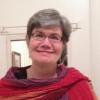It is early on a muggy summer morning at the Holy Family Food Pantry in Waukegan, Illinois. As I walk through the pantry recording the temperatures of our 27 freezers and refrigerators, I notice that inside the pantry it is a whopping 82 degrees. While finishing my task, I thank God for all of the donated fans and AC units that will do their magic to offer a comfortable place for our guests by 10 a.m.
The consolidated parish called La Santísima Trinidad, Most Blessed Trinity, took an empty church building, removed the pews, and filled it with food. Families in all shapes and sizes, the elderly on a fixed income, those offered citizenship and those denied it, those with homes and those without are all invited to receive food. This same description can fit all those who donate food too. I recently had a woman bring me a bag with four cans of corn in it. She told me that last year, while homeless, we really helped her, and she wanted to start giving back.
What has been most evident to me in my short year here as director of this privileged ministry is that whether we bring food in to donate or give it out to feed our family, we are each of us being Christ's bread for another. Everyone, whether serving or being served, is needy, hungry, and looking to be fed. Our needs may be different, and not always equal, but we definitely need each other.
Our needs intertwine here at the food pantry. Perhaps I am a newly arrived immigrant who showed up this morning with nothing but the clothes I was wearing on this long, precarious journey. While receiving a bag of groceries and some clothing, I can also listen to a seasoned paisano/a, a man or woman from my own country who has been here for years, and can explain the pitfalls to avoid. I may be retired from a huge corporation where I worked at a menial job that did not allow me to do much more than support my family. Now, I have time to give of myself and my time to others, learning the Gospel call to feed the hungry and clothe the naked. Or, I spent my life at various jobs, and at one point, needed a food pantry to put food on the table for my children. Now, I can give back to others and listen with the heart of one who has been there.
This is accompaniment, or acompañamiento. Whoever walks through the doors of this food cupboard, whether to serve or be served, experiences our deepest connection, the liberating presence of God. In our being together, in our sharing of both our food and our hearts, we mirror how God walks with us. We are, each of us, searching to find meaning, to connect with the Divine. In the going along together, in the search, we each find newness of life and strength to tackle whatever comes.
Acompañamiento is a practice deeply rooted in liberation theology. We are called to live as Jesus lived. Loving, feeling with our neighbors, leads us to transformation. In our solidarity, our neighbors and we learn a deeper understanding of God's mysterious presence among us. We transgress boundaries that perpetuate an "us" and "them." There is no longer a paradigm in which one helps and another receives help.
U.S. theologian, Roberto Goizueta wrote two primers about the praxis of accompaniment: Christ our Companion and Caminemos Con Jesús. Accompaniment, Goizueta states, is rooted in the communal worldview of the Latino people. This way of being in the world experiences the individual as a member of the community. No one is alone. No one is left out. The "el otro/la otra" or "the other" is replaced with "nosotros/nosotras" or "we." Relationship with others defines human existence; the common good is considered above individual benefits.
The summer heat will not deter us from struggling to accompany one another. Throughout the day, I will meet a woman from Belize whose son, still there, just suffered a terrible accident. She is trying to send money back to her country for him, and therefore needs some food to feed her other children living here. I will see L.T., who was supposed to come home with cleaning supplies but went right for the liquor store instead. I will welcome a new family who just moved to Waukegan. With each of these neighbors, I will also share my faith and my deep desire for justice and right relationship. Three volunteers will ask me to visit with guests who are looking for services. One of these volunteers will confide in me that her brother is struggling with similar issues of no work and no resources.
Meister Eckhart, a 13th-century Dominican mystic, reminds us, "There is no such thing as 'my' bread. All bread is ours and is given to me, to others through me, and to me through others." Our liberation is bound together as the people of God. In the midst of it all, in our giving and receiving, we accompany each other.
[Peggy Ryan is a Dominican Sister of Sinsinawa who recently completed her Doctor of Ministry degree from Barry University in Miami Shores, Florida. As part of her parish ministry, Peggy and the other Dominican Sisters with whom she lives, offer weekend retreats of service and theological reflection.]
